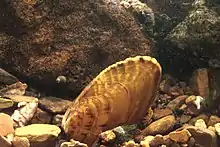Ptychobranchus subtentum
Ptychobranchus subtentum, also known as the fluted kidneyshell, is a species of freshwater mussel, an aquatic bivalve mollusk in the family Unionidae, the river mussels.
| Ptychobranchus subtentum | |
|---|---|
 | |
| Scientific classification | |
| Domain: | Eukaryota |
| Kingdom: | Animalia |
| Phylum: | Mollusca |
| Class: | Bivalvia |
| Order: | Unionida |
| Family: | Unionidae |
| Genus: | Ptychobranchus |
| Species: | P. subtentum |
| Binomial name | |
| Ptychobranchus subtentum (Say, 1825) | |
This species is endemic to the drainages of the Cumberland River and the Tennessee River in the United States.[1]
Reproduction
All Unionidae are known to use the gills, fins, or skin of a host fish for nutrients during the larval glochidia stage. Ptychobranchus subtentum enclose their larvae in a membranous capsule that resembles the pupae of black flies. When a fish bites the capsule bait, the Ptychobranchus subtentum larvae are forced out through the mimic capsule's "eyes" and then attach to the gills of the host fish.[2]
_(9934762674).jpg.webp)
Shell morphology
References
- "Ptychobranchus subtentum". NatureServe. Retrieved 2011-12-02.
- M. C. Barnhart (1998–2006). "Fluted kidneyshell: Ptychobranchus subtentum". Unio Gallery.
This article is issued from Wikipedia. The text is licensed under Creative Commons - Attribution - Sharealike. Additional terms may apply for the media files.
